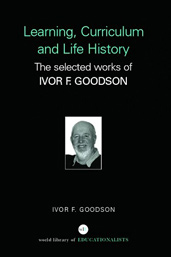Learning, Curriculum and Life Politics: the selected works of Ivor F. Goodson
Nations at Risk
Lessons from previous historical episodes must be treated with considerable caution for we are not comparing like with like. Yet so clear have been the experiences of teachers and taught in the face of previous 19th Century government interventions in matters of curriculum and assessment that the pious simplifications behind The Times's viewpoint should be severely scrutinized. For it may not be the case that "standards in short, will rise" rather "morale, in short, will fall."
A major experiment in state control of school curricula was conducted in the years 1862 to 1895. The teachers were made subject to a system of 'payment by results': the teachers' pay was linked to pupils' results in school examinations. E.G.A Holmes, a school inspector at the time, has left a detailed commentary on the results of this experiment. He notes that from 1862 to 1895 'a considerable part of the Grant received by each school was paid on the results of a yearly examination held by H.M. [Her Majesty's] Inspector on an elaborate syllabus, formulated by the Department and binding on all schools alike'. The results of this mechanism were clear. 'On the official report which followed this examination depended the reputation and financial prosperity of the school, and the reputation and financial prosperity of the teacher' (Holmes, 1928, pp. 103). The Government therefore had established deliberate and detail control over curriculum and assessment and thereby over the teacher and student. Power was thus established, but what of the 'side-effects' on education? On this Holmes was adamant:
The consequent pressure on the teacher to exert himself was well nigh irresistible; and he had no choice but to transmit that pressure to his subordinates and his pupils. The result was that in those days the average school was a hive of industry.
But it was also a hive of misdirected energy. The State, in prescribing a syllabus which was to be followed, in all the subjects of instruction, by all the schools in the country, without regard to local or personal considerations, was guilty of one capital offence. It did all his thinking for the teacher. It told him in precise detail what he was to do each year in each 'Standard', how he was to handle each subject, and how far he was to go in it; what width of ground he was to cover; what amount of knowledge, what degree of accuracy was required for a 'pass'. In other words, it provided him with his ideals, his general conceptions, his more immediate aims, his schemes of work; and if it did not control his methods in all their details, it gave him (by implication) hints and suggestions with regard to these on which he was not slow to act; for it told him that the work done in each class and each subject would be tested at the end of each year by a careful examination of each individual child; and it was inevitable that in his endeavour to adapt his teaching to the type of question which his experience of the yearly examination led hmm to expect, he should gradually deliver himself, mind and soul, into the hands of the officials of the Department, the officials at Whitehall who framed the yearly syllabus, and the officials in the various districts who examined on it.
